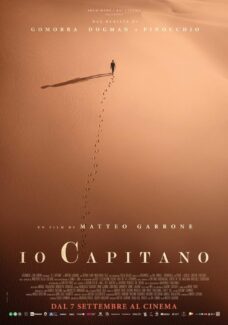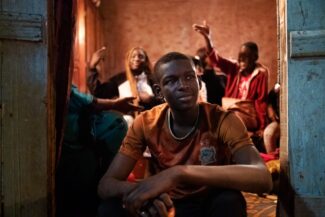Io Capitano (Matteo Garrone, 2024): Italy, Belgium, & France
Reviewed by Elyssa Crutchfield. Viewed at the Santa Barbara International Film Festival 2024.
 Italian director Matteo Garrone, known for his prior productions, Gomorra (2008) and his fantastical re-telling of Pinnochio (2019), co-wrote and directed the contemporary odyssey Io Capitano (2023). Io Capitano is based on the stories of countless immigrants hoping for a better life in Europe than in their poorer home countries, willing to brave the countless dangers in between them and their desired destination. Paolo Carnera creates a stunning visualization to accompany this journey with his cinematography, and the two young stars of the film, Seydou Sarr and Moustapha Fall, bring the characters to life. These two young boys both share the ambitions of the characters, wanting to move from Africa to wealthier Western countries, not to escape war but to gain opportunities and better their lives.
Italian director Matteo Garrone, known for his prior productions, Gomorra (2008) and his fantastical re-telling of Pinnochio (2019), co-wrote and directed the contemporary odyssey Io Capitano (2023). Io Capitano is based on the stories of countless immigrants hoping for a better life in Europe than in their poorer home countries, willing to brave the countless dangers in between them and their desired destination. Paolo Carnera creates a stunning visualization to accompany this journey with his cinematography, and the two young stars of the film, Seydou Sarr and Moustapha Fall, bring the characters to life. These two young boys both share the ambitions of the characters, wanting to move from Africa to wealthier Western countries, not to escape war but to gain opportunities and better their lives.
The film follows the journey of two teenage cousins, Seydou and Moussa, as they leave their home in Senegal and try to make the long and dangerous journey to Europe. They have secretly saved up money for the journey and embarked on it at night, not telling their family or friends of their plans to leave. In fact, Seydou’s mother warns him against migrating north, warning that only death awaits those who are foolish enough to attempt it. Life in Senegal is depicted as vibrant and familiar, with bright colors and close blocking, which is very comfortable for the boys, but their ambitions pull them away. They face many perils on their journey, both natural and manmade: passage across the unforgiving Saharan desert and the Mediterranean, illness and fatigue, and the corruption of human systems in between them and their future.
 Io Capitano is a particularly compelling and important immigrant story for two main reasons. Firstly, it is told not from a western lens, not about the immigrants arriving in a strange country seeking aid, but instead it follows the boys from beginning to end and exposes the greatest threats and uncertainties they faced. This is the reality for countless immigrants every year, and thousands have died trying to make this same journey. In writing this film, Garrone ensured that the reality of this situation was captured by listening to and drawing from the actual accounts of people who have survived this ordeal. He described in an interview at the Santa Barbara International Film Festival that almost all of the background actors were real immigrants, who he learned a great deal from in this process. The second reason this film was so successful in capturing the gravity of this ordeal is the performance of the lead actors. Both Sarr and Fall were kept oblivious as to whether or not their characters would succeed or die trying, given the script on a daily basis as they filmed chronologically. They felt the character’s uncertainty and fear, and the audience resonated with that.
Io Capitano is a particularly compelling and important immigrant story for two main reasons. Firstly, it is told not from a western lens, not about the immigrants arriving in a strange country seeking aid, but instead it follows the boys from beginning to end and exposes the greatest threats and uncertainties they faced. This is the reality for countless immigrants every year, and thousands have died trying to make this same journey. In writing this film, Garrone ensured that the reality of this situation was captured by listening to and drawing from the actual accounts of people who have survived this ordeal. He described in an interview at the Santa Barbara International Film Festival that almost all of the background actors were real immigrants, who he learned a great deal from in this process. The second reason this film was so successful in capturing the gravity of this ordeal is the performance of the lead actors. Both Sarr and Fall were kept oblivious as to whether or not their characters would succeed or die trying, given the script on a daily basis as they filmed chronologically. They felt the character’s uncertainty and fear, and the audience resonated with that.
This film was written to give voices to those who don’t usually have one, to the countless immigrants lost in backward systems. I think it’s an artful portrayal of the difficulties imposed on people unfortunate enough to be born in a place with fewer opportunities. In their homes, Seydou and Moussa had love and joy, but they had no socio-economic mobility; they did not have true freedom, and there is no opportunity for them to gain such freedom unless they are willing to put their lives on the line. I think it is easy to lose stories like this about inhumanity, tragedy, and the need to “root for the underdog.” But Io Capitano never belittles those trying to make the journey; it never placates its subjects but instead allows for a diversity of emotions to bring together the emotional throughline of the film. It is a well-made, beautiful, and digestible film that really clearly communicates how strong you need to be to succeed in this journey. Stronger than anyone should need to be to simply have the freedom of choice in their future.
About this entry
You’re currently reading “Io Capitano (Matteo Garrone, 2024): Italy, Belgium, & France,” an entry on Student Film Reviews
- Published:
- 03.03.24 / 11pm
- Category:
- Films, Santa Barbara Film Festival 2024
1 Comment
Jump to comment form | comments rss [?]